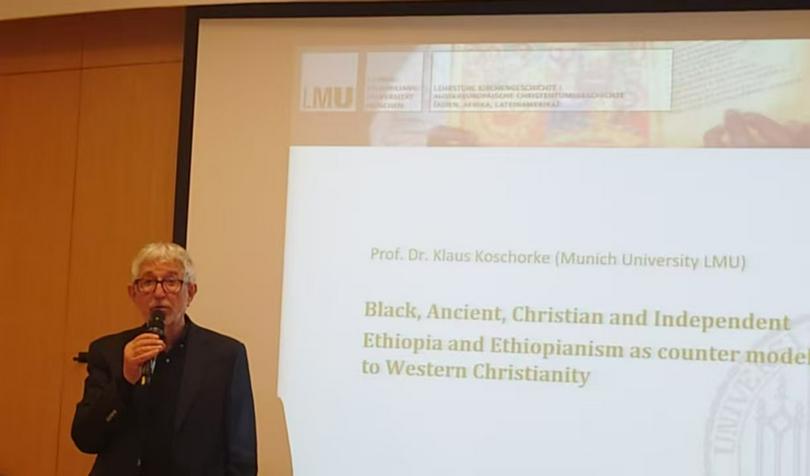On November 19, Prof. Dr Klaus Koschorke, chair of Early and Global History of Christianity at the University of Munich, delivered a lecture titled "Black, Ancient, Christian, and Independent: The Ethiopian Church (4th-20th Centuries) as a Countermodel to Western Christianity" at the Divinity School of Chung Chi College (DSCCC), The Chinese University of Hong Kong (CUHK).
The presentation offered a structural critique of traditional church history, which often equates the global spread of Christianity with the history of Western colonial expansion. Prof. Koschorke challenged this narrative, arguing that it ignores the existence of vibrant Christian communities that thrived outside of Europe long before the arrival of modern missionaries.
To correct this imbalance, Prof. Koschorke argued for a "polycentric" view of Christian origins—the idea that the faith had multiple independent birthplaces, not just in the West. He posited that the Ethiopian Orthodox Church serves as the primary example of a non-Western, pre-colonial Christianity. Unlike churches established by colonial powers in the 19th century, the Ethiopian Church established its own orthodoxy and institutional structures in antiquity, proving that African Christianity is not inherently a byproduct of Western influence.
Prof. Koschorke highlighted the fourth-century conversion of King Ezana of the Aksumite Empire (modern-day Ethiopia) to illustrate this independence. He noted that this event occurred roughly the same time Emperor Constantine legalized Christianity in the Roman Empire, making Ethiopia one of the world's oldest Christian nations. Crucially, Prof. Koschorke explained the cultural divergence that followed: while Western Christianity was shaped by Greek and Latin heritage, Ethiopian Christianity took root in a Semitic context. It utilized its own local language, Ge'ez, for scripture and liturgy rather than Latin. Furthermore, the rise of Islam in the seventh century geographically isolated Ethiopia from Europe. Prof. Koschorke argued that this isolation allowed the church to develop unique indigenous traditions—such as the rock-hewn churches of Lalibela—completely free from the oversight of the Pope of the Catholic Church or Western councils.
The lecture cited the 16th century as a defining moment for this theological autonomy. When Portuguese Jesuit missionaries arrived in Ethiopia, they attempted to "correct" local practices to align with Roman Catholic norms. Prof. Koschorke described how the Ethiopian leadership rejected this foreign intervention and expelled the missionaries. This historical episode served as powerful proof that African Christianity possessed its own valid apostolic heritage and did not require validation from Western ecclesiastical authorities.
Moving to the modern colonial era, the professor analyzed the impact of the 1896 Battle of Adwa, where Ethiopia successfully repelled Italian invaders. In a time when European powers controlled almost the entire African continent, Ethiopia remained the only independent, Black, Christian nation. Prof. Koschorke explained that this victory shattered the colonial myth that Christianity was synonymous with "whiteness" and "Western civilization." Consequently, Ethiopia became a symbolic "Zion" for the African diaspora. The biblical verse Psalm 68:31—"Ethiopia shall soon stretch out her hands unto God"—was reinterpreted by Black Christians worldwide not just as scripture, but as a prophecy of political and religious liberation from white control.
Prof. Koschorke traced how this ideology, known as "Ethiopianism," inspired practical action against racism within Western mission churches. He pointed to the case of Samuel Ajayi Crowther, the first Black Anglican Bishop in Nigeria, who was marginalized by white subordinates despite his high rank. This betrayal by Western institutions drove African leaders to seek alternatives. He detailed how this led to the founding of independent churches in South Africa, which eventually merged with the African Methodist Episcopal (AME) Church in the United States. This alliance created a global network of Black Christians who bypassed European authority entirely, rooting their legitimacy in the ancient Ethiopian tradition.
The lecture ended with Prof. Koschorke reflecting on the necessity of integrating these narratives into the broader study of theology. He concluded that the Ethiopian case offers a vital paradigm for the future of World Christianity, demonstrating that the faith can be simultaneously ancient, orthodox, and fundamentally non-Western.












